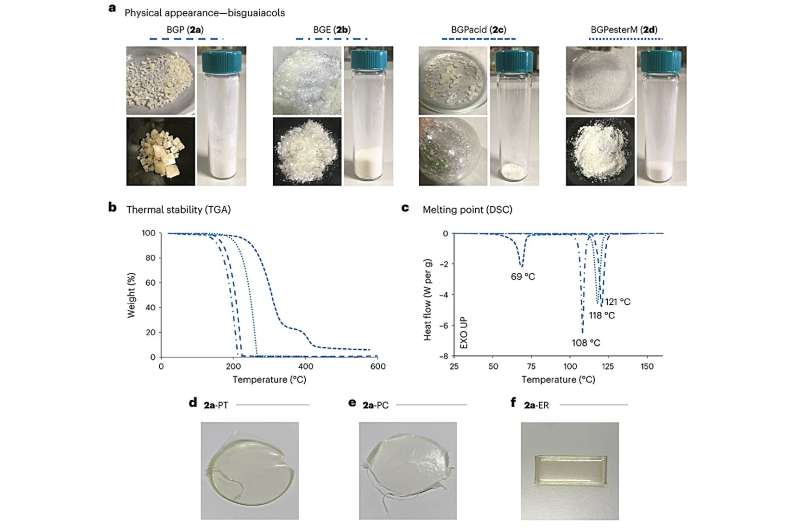September 8, 2023 report
This article has been reviewed according to Science X's editorial process and policies. Editors have highlighted the following attributes while ensuring the content's credibility:
fact-checked
peer-reviewed publication
trusted source
proofread
Using lignin and a catalyst to create an alternative to bisphenol A (BPA)

A team of microbiologists and chemists at the Center for Sustainable Catalysis and Engineering, working with colleagues from Vrije Universiteit Brussel, the Flemish Institute for Technological Research and Rheology and Technology (SMaRT), KU Leuven, all in Belgium, has developed a replacement for bisphenol A, a compound used to make plastics.
In their paper published in the journal Nature Sustainability, the group describes their lignin-based process and its performance. Bert Weckhuysen, with Utrecht University, has published a News & Views piece in the same journal issue outlining the work done by the team on this new effort. Also, the editors at Nature have published a Research Highlight report in the same journal issue summarizing the work.
Bisphenol A (BPA) is a synthetic, organic compound that is used to make a wide variety of polymers and epoxy resins, which means that it is used to produce different kinds of plastics. When used in such a fashion, it remains in the finished product. Prior research has shown that in some products, BPA can be released during use, such as when drinking from a plastic bottle, and it is also released when the material is heated.
Consumption of BPA can lead to health problems such as breast and testicular cancer, and in some cases, infertility. Production of BPA also requires the use of fossil fuels, which contributes to climate change. Scientists have been working to find a suitable replacement for BPA in the manufacture of plastics that does not cause other health problems or require the use of fossil fuels to produce.
In this new effort, the research team developed what they believe to be a suitable replacement—a group of compounds called bisguaiacols, all of which are based on the use of lignin, a key component of wood. The bisguaiacols are created by inciting reactions between an alkene and a bio-based arene (such as guaiacol)—all set off by H-USY, a recyclable zeolite catalyst.
The researchers confirmed that their compounds could be used to make cleaner and healthier plastics. Initial testing also failed to find toxicity in humans.
More information: Laura Trullemans et al, Renewable and safer bisphenol A substitutes enabled by selective zeolite alkylation, Nature Sustainability (2023). DOI: 10.1038/s41893-023-01201-w
Bert M. Weckhuysen, A sustainable alternative to bisphenol A, Nature Sustainability (2023). DOI: 10.1038/s41893-023-01205-6
Wood component yields useful plastics—without the health risks, Nature (2023). DOI: 10.1038/d41586-023-02717-z
Journal information: Nature Sustainability , Nature
© 2023 Science X Network





















